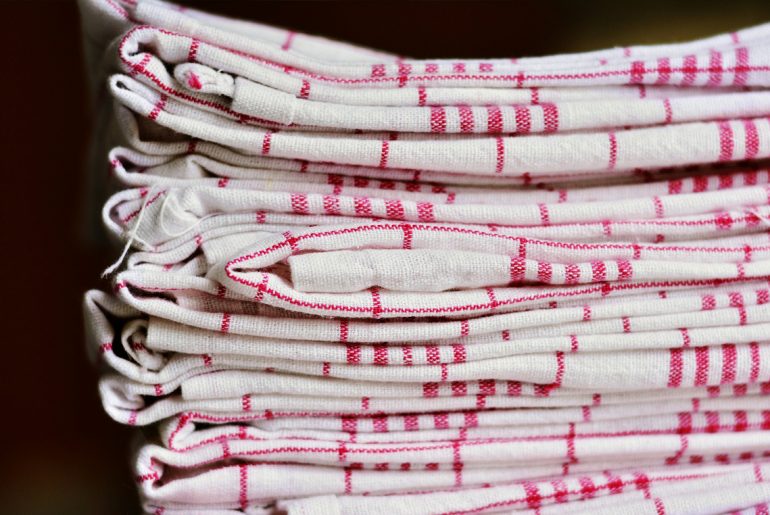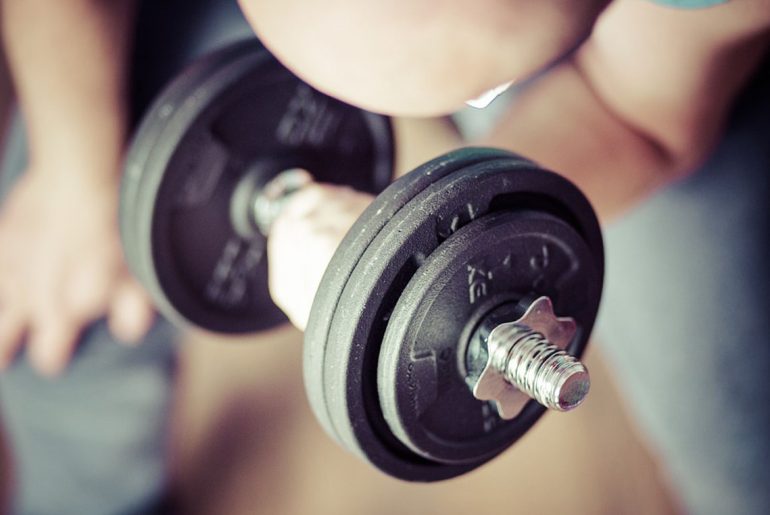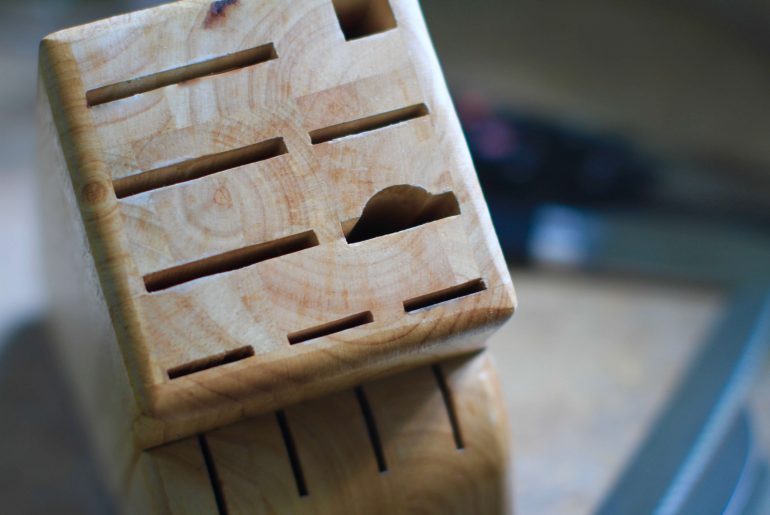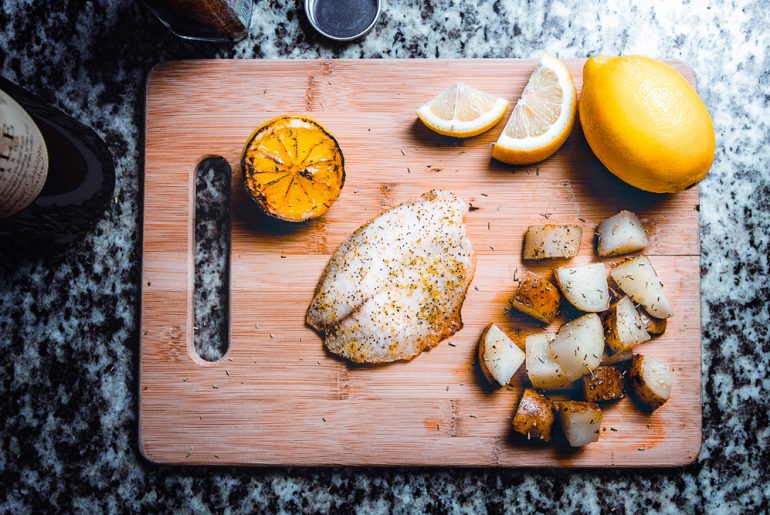Last flu season nearly 38 million people came down with the illness. Of those, 531,000 were hospitalized, and between 36,400 and 61,200 people died, according to the Centers for Disease Control and Prevention. Of course the usual advice is great: Get the vaccine, wash your hands often, and avoid contact with anyone who has been sick. But beyond that, is there anything else we can do? Most illness are spread by your hands, so using sanitizer and washing them regularly is extremely important, especially after coming home from a day in our germ-ridden world. So that really is the number one thing you can do. But what’s some other advice for avoiding the flu this season all together? Disinfect items you touch often. Your cell phone, tablet, and desk phone are all prime hiding spots for germs. You touch the outside world, then touch your cell, then put it to your…
Your kitchen towel could be loaded with bacteria, study shows
We were already weary of kitchen sponges, but now we know to look out for kitchen towels, too. Kitchen towels do many duties from wiping to drying, holding hot things and cleaning surfaces. They’re ubiquitous in households around the world, but now we know, those pretty patterns might be hiding some dangerous secrets. A new study from the University of Mauritius reported by the American Society for Microbiology found that family size and type of diet factor into the growth rate of the bacteria on kitchen towels that can lead to food poisoning and other serious infections. Researchers took an up close look at 100 kitchen towels after one month of use and found that 49 percent of the towels contained high levels of bacterial growth. The bacteria count increased with the size of the family and also when children or extended families were present. In households where towels had more than…
These two workout classes are dirtier than your toilet
Gym classes are a great way to keep up motivation to workout. However the camaraderie you build when spinning or spotting isn’t the only thing you’re sharing. It seems that certain gym classes leave you more open to swapping bacteria. While all gym equipment — and all public places, for that matter — carry some expectation of germs, a recent study conducted by EllipticalReviews.com found that there are two gym classes in particular that are more unhygienic than a toilet. The researchers took three swab samples from equipment in four different workout classes (spin, hot yoga, barre, and weight-based workouts). The swabs were measured for the volume of microbes found and then the three samples were averaged to determine the level of colony-forming units (CFU). Weight-based workouts were the worst, with an average of 153,410 CFU detected on an average barbell. For comparison, a toilet seat comes in with about 3,200 CFU — that…
How to safely roast a turkey this Thanksgiving
Thanksgiving hosts have a lot to worry about when preparing the year’s most anticipated feast; lumpy gravy, broken wine corks, unexpected dinner guests. But while there are plenty of things that can go wrong, there is only one thing that can truly turn the holiday merriment into misery. Food poisoning. According to the Center for Disease Control and Prevention (CDC), each year, about 48 million people will get sick from a foodborne illness. While summer’s picnics and camps are prime time for foodborne illness, these diseases also spike sharply during the holiday season. Marianne H. Gravely, Senior Technical Information Specialist of the Food Safety Education Staff at the USDA, gives us some tips on making sure you prepare a Thanksgiving feast that’s memorable — for all the right reasons. Storing a turkey before Thanksgiving Start by cleaning out your refrigerator. Whether you’re making all of the dishes yourself, or guests are bringing some to your house, all this food needs a place to…
Guts bring glory: microbiomes of elite athletes may mean an edge
Elite athletes often work their entires lives to excel in their sport, but new research shows they may also get a slight edge from their digestive tracts. Scientists have tapped into the microbiome of elite runners and rowers to identify certain bacteria that may be responsible for a boost in their athletic performance. “When we first started thinking about this, I was asked whether we could use genomics to predict the next Michael Jordan,” says Jonathan Scheiman, Ph.D., fellow in the laboratory of George Church, Ph.D. at Harvard Medical School. “But my response was that a better question is: Can you extract Jordan’s biology and give it to others to help make the next Michael Jordan?” To identify which bacteria support athletic performance, researchers collected daily samples of 20 athletes training for world-reknown Boston marathon in 2015. The microbiomes were then examined for changes between performance and recovery. In studying the…
Stop bacteria from building up in your knife block
How to Clean a Knife Block Your floors, fridge, countertops and even oven make in on to your regular cleaning checklist, but there’s one surface in your kitchen you have probably never even touched. Consider your knife block. Sure, your knives are clean when you stow them in the slots, but dust and other debris can accumulate in these small spaces anyway. Despite our usual disregard for them, knife blocks should actually be washed and sanitized monthly if use frequently. Moisture can lead to mold and bacteria build-up, so to avoid larger cleaning issues, wash knives after each use and dry each thoroughly before sliding back into the knife block. Sanitize a knife block by following these simple steps: Step 1: Remove any knives stored in the block and set aside. Turn the block upside side over the sink and shake lightly to remove large debris. Step 2: Use a…
You’re cleaning your cutting board wrong and it could make you ill
Raw meat, juicy fruits and vegetables, herbs, fish — your cutting board has been underneath it all. Cutting boards are an integral part of any kitchen, but with all of this chopping action, isn’t there a hygiene concern? Most of us wash our cutting boards with warm, soapy water, thinking we’ve taken care of the task, then happily move on to something else. But cutting boards have been found to harbor 200 percent more fecal bacteria than your everyday toilet seat. It’s time to switch up our cleaning routine. Washing with soapy liquid is effective at killing harmful bacteria present on other kitchen items — plates, cutlery, utensils, counters — it just can’t compete with the cold, hard surface of a cutting board, meaning bacteria can linger and make you ill. Sarah from Expert Home Tips told The Mirror that bleach is the answer. “Soaking chopping boards in bleach after every use will…







